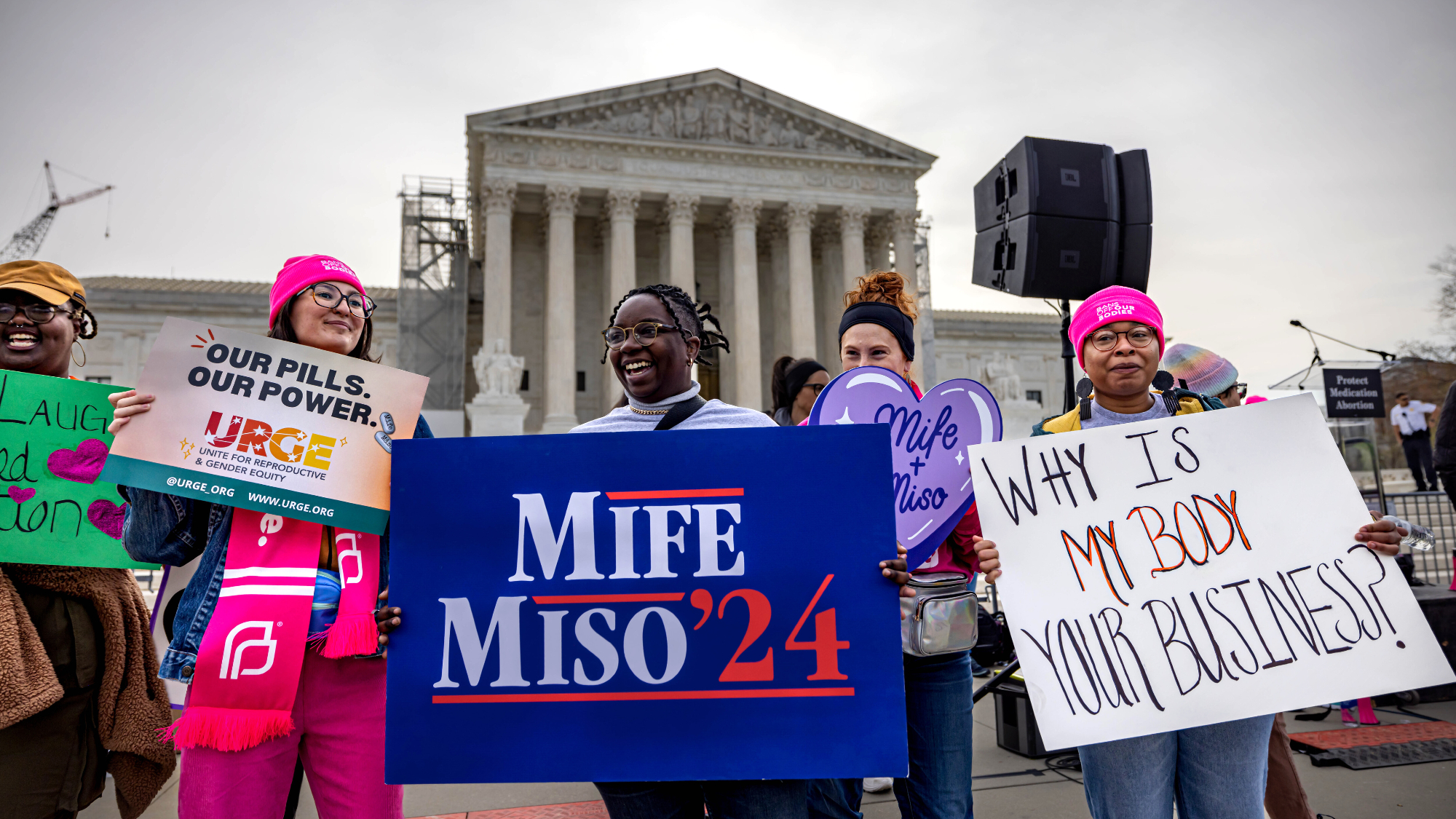Supreme Court rejects abortion pill challenge
Access to mifepristone has been preserved, though some think it is only a temporary victory


A free daily email with the biggest news stories of the day – and the best features from TheWeek.com
You are now subscribed
Your newsletter sign-up was successful
What happened
The Supreme Court on Thursday rejected a push by anti-abortion groups to restrict access to the abortion medication mifepristone, ruling unanimously that plaintiffs lacked standing to bring the case.
Who said what
The anti-abortion doctors named as plaintiffs have "sincere legal, moral, ideological and policy objections" to the widely available drug, Justice Brett Kavanaugh wrote in the ruling, but their "desire to make a drug less available for others does not establish standing to sue." Thursday's ruling was the "first major abortion issue to come before the court since its 2022 decision overturning Roe v. Wade," The Wall Street Journal said. Rejecting the mifepristone challenge on procedural grounds allowed the justices to find "common ground."
Thursday's ruling is "not a 'win' for abortion," Nancy Northup at the Center for Reproductive Rights said in a statement. It simply "maintains the status quo, which is a dire public health crisis in which 14 states have criminalized abortion." This was a "sad day for all who value women's health and unborn children's lives," Katie Daniel at Susan B. Anthony Pro-Life America said to the BBC. But "the fight to stop dangerous mail-order abortion drugs is not over."
What next?
Kavanaugh's ruling held "potentially useful hints for abortion opponents, laying out a path" for similar challenges in the future, Politico said. Anti-abortion leaders anticipate better luck advancing the merits of their case in "litigation Idaho, Kansas and Missouri are pursuing before the same Trump-appointed judge" whose 2023 ruling "would have banned abortion pills nationwide."
The Week
Escape your echo chamber. Get the facts behind the news, plus analysis from multiple perspectives.

Sign up for The Week's Free Newsletters
From our morning news briefing to a weekly Good News Newsletter, get the best of The Week delivered directly to your inbox.
From our morning news briefing to a weekly Good News Newsletter, get the best of The Week delivered directly to your inbox.
A free daily email with the biggest news stories of the day – and the best features from TheWeek.com
Rafi Schwartz has worked as a politics writer at The Week since 2022, where he covers elections, Congress and the White House. He was previously a contributing writer with Mic focusing largely on politics, a senior writer with Splinter News, a staff writer for Fusion's news lab, and the managing editor of Heeb Magazine, a Jewish life and culture publication. Rafi's work has appeared in Rolling Stone, GOOD and The Forward, among others.
-
 5 cinematic cartoons about Bezos betting big on 'Melania'
5 cinematic cartoons about Bezos betting big on 'Melania'Cartoons Artists take on a girlboss, a fetching newspaper, and more
-
 The fall of the generals: China’s military purge
The fall of the generals: China’s military purgeIn the Spotlight Xi Jinping’s extraordinary removal of senior general proves that no-one is safe from anti-corruption drive that has investigated millions
-
 Why the Gorton and Denton by-election is a ‘Frankenstein’s monster’
Why the Gorton and Denton by-election is a ‘Frankenstein’s monster’Talking Point Reform and the Greens have the Labour seat in their sights, but the constituency’s complex demographics make messaging tricky
-
 Trump links funding to name on Penn Station
Trump links funding to name on Penn StationSpeed Read Trump “can restart the funding with a snap of his fingers,” a Schumer insider said
-
 Trump reclassifies 50,000 federal jobs to ease firings
Trump reclassifies 50,000 federal jobs to ease firingsSpeed Read The rule strips longstanding job protections from federal workers
-
 Supreme Court upholds California gerrymander
Supreme Court upholds California gerrymanderSpeed Read The emergency docket order had no dissents from the court
-
 700 ICE agents exit Twin Cities amid legal chaos
700 ICE agents exit Twin Cities amid legal chaosSpeed Read More than 2,000 agents remain in the region
-
 Trump demands $1B from Harvard, deepening feud
Trump demands $1B from Harvard, deepening feudSpeed Read Trump has continually gone after the university during his second term
-
 House ends brief shutdown, tees up ICE showdown
House ends brief shutdown, tees up ICE showdownSpeed Read Numerous Democrats joined most Republicans in voting yes
-
 Trump’s Kennedy Center closure plan draws ire
Trump’s Kennedy Center closure plan draws ireSpeed Read Trump said he will close the center for two years for ‘renovations’
-
 Trump's ‘weaponization czar’ demoted at DOJ
Trump's ‘weaponization czar’ demoted at DOJSpeed Read Ed Martin lost his title as assistant attorney general
